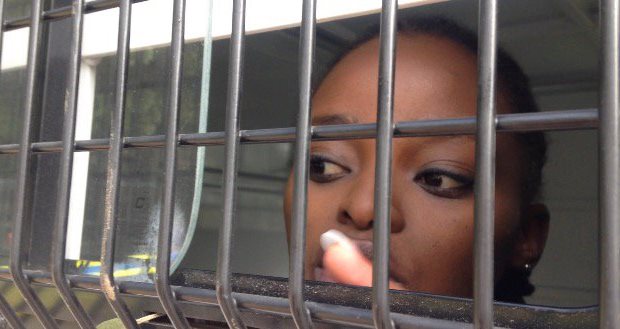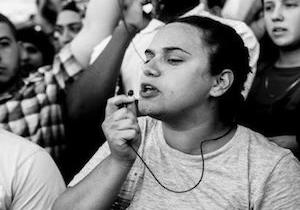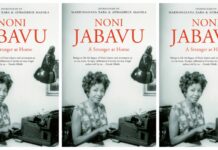The late Winnie Madikizela-Mandela had a range of identities that do not fit neatly into the conventional understanding of “Mother of the Nation” as she is being called. Mam’ Winnie was a medical social worker, a wife, an activist, a soldier on the ground, a mother, a leader of the struggle. Her history and legacy was always contested and distorted – and it remains thus in her death. The Daily Vox spoke to black women activists about Mam’ Winnie’s vilification and the lessons they learned about being custodians of their own histories.
You were strong when we couldn’t be. You were a rage that sometimes burned too brightly and you showed us how to be brave and be our fearsome best. Lion. Warrior. Mother. Mkhonto. #WinnieMandela
— Sisonke Msimang (@Sisonkemsimang) April 2, 2018
Busisiwe Seabe, 24, social justice activist
Mam’ Winnie is a struggle hero that refused to go into a coalition government with people like De Klerk, who refused to let our apartheid oppressors play an active role in the governance of the country. That means she alienated herself from the idea of a rainbow nation that Nelson Mandela supposedly fought so hard for. Mama held the position that before we can get to this idea of a rainbow nation we need the land back, we need to get access to what we were fighting for in the liberation struggle. The fact that they called her the mother of the nation meant that they wanted power over not only her name but her character as well. As a mother you’re supposed to be strong, you’re supposed to take care of the family – there’s this idea of a woman that fits into society. It’s not an idea that Mama fit into, according to the patriarchal understanding of what a black woman is. She rejected the identity that was given to her by people, specifically by men. As black women activists, we need to document and archive our lived experiences. We need to do research about black women not only in South Africa but in the African continent. We need to forge solidarity amongst black women. We need to gather the histories of other women in the political parties that contributed to the struggle. We need to reject the patriarchy and what the patriarchy has done to our institutions. This is what uMama practised.
This is a review of the book 491 Days that I did a few years ago. Of course I was reminded of it.
Winnie Madikizela-Mandela could have done with stage 4 load shedding in May 1969. Police kicked doors open to her Soweto home, scavenged through intimate belongings, took her away,
— Busisiwe C Seabe (@Ms_BSeabe) April 3, 2018
Alex Hotz, 27, feminist activist
The problem is there’s always a comparison between Mam’ Winnie and Nelson which is problematic because it takes away from her own agency and activism. She was unapologetically radical and clear about her politics till the very end, and was unwilling to compromise on certain things. It’s the history of black women in the struggle who are always seen a complex and difficult characters. We’re never praised in the same ways in which men are. On the front page of a newspaper you don’t see “Nelson Mandela The Wifebeater Died”. You see “Nelson Mandela The Hero Has Passed”. Part of the problem is that we haven’t written enough about black women in our struggle and so it’s always been told by other people. It’s important to learn more of our own histories as black women, it needs to be taught in schools. When we learn about Nelson Mandela, why are we not learning about Winnie Mandela the icon and the leader that burned the torch in the dark days of apartheid when everyone else was exiled and imprisoned? She was by no means the flower of the revolution, she was the revolution. She was the mother and the fighter. She was the breadwinner and the leader. To reduce her as the mother of the nation doesn’t accurately explain her contribution to politics. Mam’ Winnie was always willing to say what she believed even if it was going to cause discomfort. It’s a huge loss for us as black women and black people. She played an immense role in so many of our lives.
Black women we have to write each other’s stories. Never been so disappointed by our black male leaders.
— Firebrand (@simphiwedana) April 4, 2018
Amanda Mavuso, 23, student and gender activist
It’s heartbreaking that Mam’ Winnie is demonised and seen as Mandela’s former wife and not for her credentials as a whole in the struggle. Mam’ Winnie did more than what Mandela did but it’s the patriarchy that’s existing constantly to erase black women in the struggle. It has mostly to do with his gender and its political. Patriarchy puts women in the line but not in the front line. Looking at when Mandela and all the men of the ANC were arrested or exiled, Mam’ Winnie had to lead. Mam’ Winnie led the liberation movement but society still sees black women as secondary roles in the liberation. Mam’ Winnie fought against racism and white people are still against that even after she died. Mam’ Winnie hated white monopoly capitalists and the privilege of whiteness. As black women, we have to show up for ourselves. In our music we must talk about black women, our lyrics, poetry must have everything to do with black women. When we submit our theses or dissertations, it must be about black women because no one is going to do that for us. We must organise – not only on the ground – but we must constantly pitch up and show up for each other genuinely because no one is going to do that for us. The system is not for us, it continues to oppress us.
White people can keep their Madiba. Us we will have our Winnie. The lines were made clear a long time ago. Keep ur 64 minutes of fake care for Black people, us we will keep fighting for true liberation of our people, for land and economic freedom. Winnie continues to live in us!
— Babes Womzabalazo (@NalediChirwa) April 2, 2018












